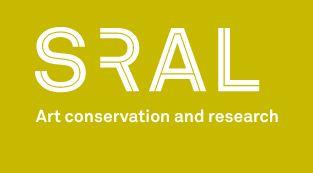
Location
SRAL Studios (Wiebengahal), Avenue Ceramique 224, 6221 KX, MaastrichtDate and time
-*Workshop: *
Modern Resins for Varnishing and Retouching
Jill Whitten, Robert Proctor & René de la Rie
19th - 21st March 2018 at SRAL Studios (Wiebengahal)
Address: Avenue Ceramique 224, 6221 KX, Maastricht
Tel: 0031 43 321 8444
Contact: Siska Losse (secretariat): info@sral.nl
Website: www.sral.nl
*Instructors*
René de la Rie (University of Amsterdam & CRCC, Paris) received M.S. and Ph.D. degrees in chemistry from the University of Amsterdam (UvA), The Netherlands. He is currently chercheur associée at the Centre de Recherche sur la Conservation des Collections (CRCC/CNRS), Paris and a guest researcher at the UvA. He was head of the scientific research department at the National Gallery of Art, Washington, DC from 1989 until 2012, a position endowed by the Andrew W. Mellon Foundation. He has also held positions at the Metropolitan Museum of Art, New York, and at the Training Program for Conservators (now UvA) and the Central Research Laboratory for Objects of Art and Science (later ICN, now RCE), both in Amsterdam. He has been an adjunct professor at the University of New York and the UvA and served as Ph.D. advisor at the latter institution. He was an editor for the journal Studies in Conservation on from 1994 un l 2011 and has published extensively.
Jill Whitten and Robert Proctor have been in private practice in Houston, Texas since 1998. They work on private and institutional collections.
Jill Whitten received a Bachelor of Fine Arts in Studio Art at the University of Texas, Austin. She studied conservation at Buffalo State College, where she received a Master of Arts and a Certificate in Conservation. She has worked as a conservator and undertaken resin research at the Art Institute of Chicago, J. Paul Getty Museum and the National Gallery of Art. She treated a collection of paintings by Frederic Remington at the Museum of Fine Arts, Houston. Since 1993 she has been lecturing and teaching workshops on resins for varnishing and retouching in North and South America and Europe.
Robert Proctor has a Bachelor of Arts in Art History from Tulane University in New Orleans and a Master of Arts and Certificate of Conservation from Buffalo State College. He trained in Munich at the Bayerisches Nationalmuseum, worked at the Saint Louis Art Museum, Indianapolis Museum of Art and Museum of Fine Arts, Houston. In addition to workshops on varnishes, Rob is a specialist in the reweaving of tears and has taught workshops on reweaving. He has worked as a contract conservator and treated a number of public murals.
*Overview*
Many different materials have been used for varnishing and retouching. Traditionally, natural resins were primarily used for this purpose. In the 20th century synthetic polymers were introduced. These are often chemically and physically more stable than their natural counterparts. The optical properties of varnishes are however largely controlled by their molecular weight. By using synthetic low molecular weight resins for varnishing and retouching, an appearance similar to that obtained using natural resins can be achieved. Factors affecting stability and appearance, as well as application methods and solvents suitable for these new resins, will be discussed.
The workshop will focus on synthetic low molecular weight resins and how they differ from polymers and dammar. Participants will use practical sessions to evaluate the properties of resins used as varnishes in terms of their application and appearance. Through these practical sessions and demonstrations, participants will establish how the choice of resin, solvent or stabiliser will affect the properties of the varnish not only on application but subsequently upon ageing. Participants will leave the master class with an individual canvas board (60x80cm) on which at least 15 varnish recipes have been tested.
*Lectures will cover: *
- Function of varnishes
- Chemical properties of resins and their degradation
- Factors affecting optical characteristics of varnishes
- Effects of stabilisers
- Retouching media
- Criteria for choosing appropriate varnishes
- Varnish application techniques
- Solvent selection: polarity, solvent strength and evaporation rates
*Materials: *
Varnishes and artist canvas boards will be provided. Participants are encouraged to bring their favourite brush for applying varnish.
*Workshop fees: *
Standard: EUR 825.00
Deadline for registration: 1 February 2018
Workshop fees will include lunches.
Registration forms are available at info@sral.nl and www.sral.nl
Numbers are limited to 15 participants and are allocated on a first come basis.
Discount bookings for accommodation at Townhouse Design Hotel only through SRAL.
Organisers: Kate Seymour and Siska Losse
Stichting Restauratie Atelier Limburg (SRAL) is a leading institute specialised in the conservation and restoration of paintings, sculptures, contemporary artworks and historic interiors. We provide an integrated approach to conservation issues through research, consultancy and education.